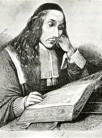Baruch Spinoza [1632-1677] Randall writes of Spinoza that he understood the universe was infinite and that he believed it was the domain inexorableunstoppable mechanical law. Spinoza was among the first to grasp and thoroughly understand the significance of Newton’s mathematical world. He found in this scientific world-view a source of awe and an object of selfless devotion.
By rationally extending the consequences of science, Spinoza found above him only the power and order of the universe and, for him, that was worthy of the name God. As far as his mind could penetrate into the vast unknown all he could see was a universe governed by mathematical law.
Randall says that in Spinoza's world-view, “Gone is the wise and loving Father, to whom man can appeal in prayer; irretrievably gone is the great Friend behind the world who cares.” Gone too is every vestige of purpose and final cause. He believes that Spinoza “anticipated the real religion of the next age.”


